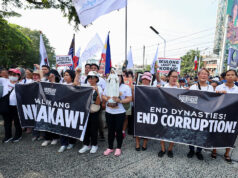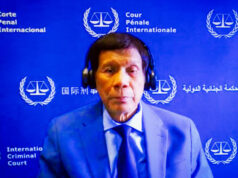Amendments to terror law in Senate plenary
By Camille A. Aguinaldo, Reporter
SENATOR Panfilo M. Lacson on Wednesday presented to the plenary the bill seeking to strengthen the country’s terrorism laws.
Senate Bill No. 2204 seeks to address the infirmities of Republic Act No. 9372 or the Human Security Act by redefining and providing additional penalties to terrorist acts as well as removing some of the limitations of law enforcement agencies to prevent and address terrorism.
In his sponsorship speech, Mr. Lacson, chair of the Senate committee on public order and dangerous drugs, said the present Human Security Act was a “dead letter law” which had not given law enforcers and prosecutors “a firm foothold to pursue terrorism cases.” He added that the law only produced one conviction from terrorism charges and a court declaration branding the Abu Sayyaf as a terrorist group, which took five years of proceedings.
“This has to stop, Mr. President. We do not need to wait for another Marawi siege, or another suicide bombing of the Mount Carmel Cathedral in Jolo, Sulu, to happen before we act on this. The danger is here, present in our midst,” he said.
He also noted that a vote into the bill would lead to the lifting of martial law in Mindanao.
“As per consultation with the Armed Forces of the Philippines and the Department of National Defense during the briefing for the extension of Martial Law for another year, a statement was made that the Martial law in Mindanao will be lifted once an effective Anti-Terrorism Law is passed by Congress,” he said.
“We have already tried various approaches such as peace talks, peace agreements, and even the grant of autonomy. Yet just a few days ago, we had bombing accidents and armed conflict in Mindanao,” Mr. Lacson said.
“On the part of the legislature, numerous resolutions were filed condemning such acts of terrorism….Why condemn if we could act? Let us combat terrorism and pass the Anti-Terror Act to ensure freedom not only from acts of terrorism but also from threats of terrorism.”
Terrorist acts under the bill include:
• attacks that cause deaths or serious injuries
• attacks that cause extensive damage to a government facility, critical infrastructure, and public or private property, and likely to endanger human life or result in major economic loss
• the manufacture, acquisition, transport, supply or use of explosive, biological or chemical weapons as well as research into development of such weapons
• release of dangerous substances causing fires, floods, explosions
The bill also changed the title of the law to Anti-Terrorism Act of 2019 from Human Security Act of 2007.
It extends the period of detention on a suspected terrorist without judicial warrant of arrest to 14 working days from the present three days with no extension. Mr. Lacson clarified that under the bill, the judge of the court nearest to the place of arrest must be notified of the situation.
“The proposed extended period of detention shall only be allowed when necessity has been established. Further, we also made sure that the judiciary plays a role in the event of detention,” he said.
The proposed measure also removed the P500,000 per day penalty to law enforcement authorities for detaining a suspect later acquitted of terrorism charges.
“It does not mean however that by deleting this provision, those unlawfully charged with violation of this law will not have any recourse in case he or she will be acquitted. In the event of an acquittal, the person illegally charged can always sue for damages under existing laws,” he said.
It also provides new penalties to acts related to the initial stages of plotting to commit terroristic acts, such as recruitment of members to join or support terrorist acts.
The proposed measure also allows for authorization to conduct surveillance to be filed before a regional trial court (RTC). Under the present law, such applications could only be filed at the Court of Appeals (CA).
“This amendment is made for the purpose of convenience and expediency granting that time is of the essence when it comes to impending threats of terrorism,” Mr. Lacson said.
It also authorizes the Anti-Terrorism Council to file an ex-parte application before the RTC for an order to compel telecommunications and internet service providers to produce all customer information and cellular records of persons suspected of committing an actual or imminent attack. The bill mandates the council to inform the National Telecommunications Commission (NTC) of such applications.



